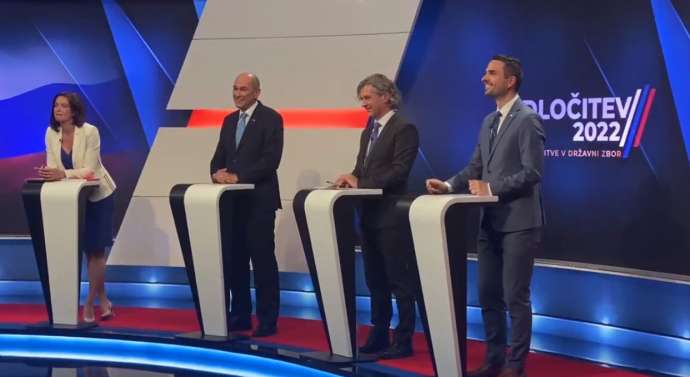STA, 13 April 2022 - Commercial channel KANAL A hosted on Tuesday evening the first televised debate between PM Janez Janša and Robert Golob, who are considered to be the main rivals in the upcoming general election. The debate, also featuring the leaders of the Social Democrats (SD) and New Slovenia (NSi), revolved around rising prices.
Janša's Democratic Party (SDS), Golob's Freedom Movement, the SD and NSi presented their views on how to best address the energy and food price hikes caused by the war in Ukraine.
The prime minister said that Slovenia had deflation of more than 1% in March due to lower electricity prices, which resulted from a government measure. On the other hand, Golob believes that many Slovenians are already feeling the pressure from the hikes.
Janša highlighted the measures his government has already taken and those that are in the works, adding that the existing measures could be extended.
The government is also working to secure other sources of oil supply, which will have an impact on stabilising energy prices, he said.
Janša also believes that Slovenia needs more land intended for food production, while NSi leader Matej Tonin mentioned a EUR 215,000 measure that should allow public institutions to buy produce directly from local farmers.
Slovenian farmers will receive EUR 30 million in an effort to mitigate the rising prices. Another measure that is being prepared is EUR 315 million for agricultural restructuring, he said.
Both Janša and Tonin noted that price hikes were part of global developments, stressing the role of the EU's actions, including joint procurement of natural gas and sanctions against Russia. The next package of sanctions will be oil-related but it will not yet involve gas supplies, Janša said.
Golob thinks that for the short term, a clear distinction should be made between households on the one hand and industry on the other, stressing that households should have regulated gas prices. The industry should meanwhile manage using costlier gas from Algeria or Qatar or realise that this will not do, which may lead to the closure of some major industrial polluters.
"Money will run out. That's why we need measures that are detailed and targeted and for which we know where the money will come from," he said. Moreover, the Freedom Movement would regulate the food chain, a measure that is also advocated by the SD.
The state must prioritise the purchase of domestically produced food, restrict exports abroad and subsidise raw materials for farmers, said SD leader Tanja Fajon.
Stressing the importance of diversifying resources, she also listed measures such as regulating fuel and energy prices, additional energy bonuses for people most hit by the crisis and a EUR 1.5 billion fund to help out companies.
Addressing youth problems, Janša pointed to the recently adopted housing state guarantee scheme for the young, highlighting the importance of digital and green transitions for improving the situation of young people.
The SD meanwhile proposes new public non-profit flats and efforts to tackle precarious work and brain drain and pursue family-friendly policies.
The Freedom Movement's proposals include reduced taxation for the first ten years of employment, or a tax break for those who want to invest in property. The party is also in favour of building rental flats that young people could buy after five years.
The NSi stressed the importance of improving the business environment and work-life balance to help young people. Tonin sees lower taxes as the solution to high property prices.
Moving on to problems facing the elderly, Janša noted that many do not receive a decent-living pension. The issue cannot be resolved overnight, he said, pointing out that increased life expectancy meant people would have to work longer.
Golob said the Freedom Movement would advocate raising the minimum pension to 10% above the poverty threshold. He also sees a solution in employing those pensioners who would like to continue working and their pension would not be reduced because of this.
Tonin noted the importance of the second pension pillar and efforts to ensure Slovenia has enough people working to contribute to the pension system.
The SocDems would meanwhile increase the minimum pension to EUR 700 by changing the care allowance scheme and enacting the demographic reserves bill to fill up the state pension purse, Fajon said.






